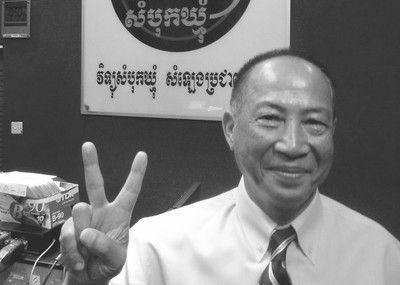By Rupert Abbott, Amnesty International’s Researcher on Cambodia, Laos and Viet Nam

It was hot – very hot – as I arrived last week at Mam Sonando’s home and radio station on a dusty street in Cambodia’s capital Phnom Penh.
He welcomed me at the front door. “Thank you,” he said. With a broad smile, he flashed his signature ‘V for victory’ sign with his right hand. After over eight months in prison, he was free and no longer facing 20 years behind bars.
Prisoner of Conscience
Mam Sonando, 72, is a well-known and popular journalist. He owns Beehive Radio, one of Cambodia’s few independent radio stations. And he heads the Association of Democrats, which promotes human rights and democracy and helps poor communities.
On 11 September 2012, his trial began at the Phnom Penh Municipal Court. He had been arrested two months earlier after Cambodia’s Prime Minister accused him publicly of being behind a plot for a village in eastern Cambodia to secede – to break away from the country.
In fact, the villagers there had been involved in a long-running land conflict with a powerful company, and the so-called secession plot was used as a pretext to forcibly evict them.
And Mam Sonando’s arrest followed his report broadcast on Beehive Radio about a complaint at the International Criminal Court, which accuses Cambodia’s government of displacing thousands of people through forced evictions.
Along with six other defendants, Sonando was charged with anti-state crimes. I attended the four-day hearing in the packed courtroom, along with his family and supporters, human rights workers, diplomats and journalists. No evidence was presented that proved he had done anything wrong.
So when the verdicts were announced on 1 October 2012, there was shock and disbelief. Mam Sonando was found guilty and sentenced to 20 years’ imprisonment for “instigating insurrection” and other offences.
Mam Sonando told me: “In prison, I thought of the people who love and missed me, including those I had helped through my association. I missed them so much. I love them and I wanted to hug them. They are all I care about,” he said.
Amnesty International recognized Mam Sonando as a prisoner of conscience, imprisoned for the peaceful exercise of his right to freedom of expression.
We joined others in Cambodia and abroad to campaign for his release. Members responded to Urgent Actions and appealed to Cambodia’s government. We asked foreign governments to raise the case with Cambodia, and we made it the focus of our advocacy when US President Barack Obama and other leaders visited Cambodia for the ASEAN and East Asia summits in November 2012.
Release
The widespread condemnation was heard. On 14 March 2013, Cambodia’s appeals court overturned the most serious anti-state convictions and two-decade sentence against Mam Sonando. Instead, he was given a five-year prison sentence for forestry offences. He had already been in prison for eight months and the rest of his sentence was suspended.
“To hear supporters outside the courtroom and to see supporters inside, including human rights organizations and diplomats, gave me such encouragement. They were supporting democracy and human rights, not just me,” Mam Sonando told me.
“I want to thank everyone for joining together for my release. Thank you to Amnesty International’s members for protecting my freedom.”
Mam Sonando was released from Phnom Penh’s Prey Sar prison on 15 March. He was met by around 1,000 jubilant supports, who lifted him up on a throne-like chair and marched him to freedom in a colourful procession.
“The nightmare of being falsely accused and imprisoned had turned into a wonderful dream; bad to good, where I could see into the people’s hearts and the world caring about justice.”
Looking forward
Would he appeal the decision to uphold some of the convictions against him, and the new conviction for forestry offences?
“I did nothing wrong and I will definitely appeal. I cannot just drop it. I have to find justice. I am not guilty and I have to set an example,” he said.
“My goal remains the same: democracy and respect for human rights in Cambodia. My case has become a symbol of unity to strengthen democracy, rule of law and human rights in Cambodia.”
And he plans to continue leading Beehive Radio and the Association of Democrats.
“There are big problems in Cambodia; very serious problems. Raising awareness about democracy and human rights is the key to solving these problems.”
Towards the end of our meeting, I asked whether he would change things, whether he would go through it all over again?
“Of course! Life is not worth living unless you’re willing to sacrifice it for others. I had to stand up, or others would suffer the same tragedy.”
Indeed, while Mam Sonando’s release is a step in the right direction for freedom of expression in Cambodia, others in the country are suffering similar tragedies.
Housing rights activist Yorm Bopha is serving a three-year prison sentence after being convicted on 27 December 2012 on trumped-up charges of “intentional violence.” And Born Samnang and Sok Sam Oeun are serving 20-year sentences as scapegoats for the killing of prominent trade union leader Chea Vichea in 2004, while the real killers have never faced justice.
Amnesty International will campaign for their release too.

